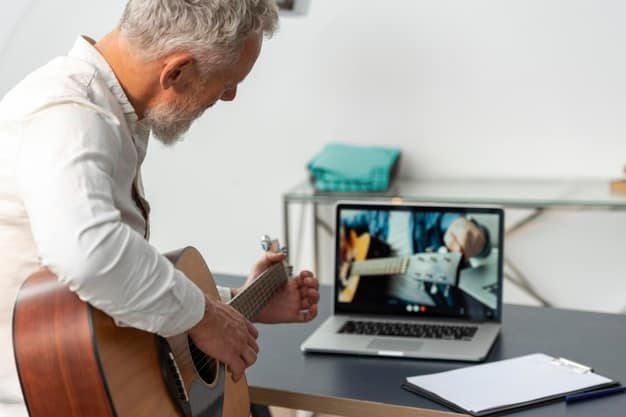Think about something you wish you could do at guitar, but is currently beyond your reach.
Maybe it’s barre chords, the Dorian mode, or sweep picking the diminished scale at 250 bpm?
No matter how far along you are in learning guitar, everyone wants to be better.
But what is the best way to improve?
For pretty much all players, having a consistent schedule of guitar lessons is essential, especially in the beginning stages. Although a weekly commitment is usual, there is no exact frequency that works for everyone, and there are a variety of factors to consider such as the amount of alone practice done.
Every student should work with their instructor to determine how often to have lessons and create a personalized plan to achieve their guitar goals.
Today, the guitar is more accessible to new players than it has ever been.
There are also so many other resources in addition to traditional lessons that influence how guitar can be learned.
Let’s look at several factors that can help you decide how you have your guitar lessons.
Are online lessons as effective as in-person ones?
When face-to-face meetings have not been possible, online video chatting such as Zoom has become the next best thing.
In optimal situations with fast internet, low to no latency, and clean video and audio, these online systems would be almost as effective as in-person guitar lessons.
However, this is not always the case and the technical difficulties of online lessons can become frustrating.
The biggest advantage of in-person lessons is the instructor can observe and correct the student’s physical playing techniques.
Being face to face also creates a more personal connection and could allow more effective communication and focus from both parties.
Are online courses as effective as one on one lessons?
Instructors have created countless online courses and materials for free or for purchase.
These courses are often very high quality and can be accessed anytime which is extremely useful for students.
The downside, however, is that these lessons may not be tailored to a particular student’s needs.
One-on-one lessons allow an instructor to create a specific curriculum they feel is right for the student.
Online courses provide the opportunity to learn from a specific guitarist who a student might want to learn from but would not have access to in person.
Group or ensemble lessons could not be as effective as private lessons
With group lessons, the teacher’s attention is divided among all the students.
This means each student would get less individual attention.
In a one-on-one lesson, the teacher can give all their attention to the student.
Working with a group does allow students to learn from each other as well.
Some students may feel more comfortable and less pressured in this social setting.
How long are your lessons?
Generally speaking, one-hour long lessons are long enough for the teacher and student to maximize the time they have with each other.
Longer lessons mean that more material will be covered in each, so they can be held less frequently compared to 30-minute lessons for example.
This means the student has a bigger responsibility to practice between lessons and must be disciplined.
Shorter 30-minute lessons should happen more frequently but mean there is less of a workload for a student to undertake in between lessons.
How much do you practice between lessons?
It is absolutely essential for students to practice in between lessons.
If not, it will waste both the student’s and the teacher’s time and each lesson will just be a review of the last
If you are a player that practices a lot, then more frequent lessons will allow you to advance quickly
Frequent lessons will not help you advance quickly if you do not practice in between them.
Lessons are a good way to motivate yourself to practice more or practice on a regular basis
How many lessons should you take weekly?
One lesson per week is a common schedule for most players.
It is not a massive commitment but still requires diligence.
Two lessons per week are also widely done for players who are more enthusiastic about learning.
The key is to have enough time in between lessons to learn the material.
Having three or more one on one lessons per week would be a massive commitment and could prove to be overly stressful and ineffective.
The fact is that most of guitar progress comes from practicing alone.
Scheduling more and more lessons will not help without individual practice.
Should you take biweekly or monthly lessons?
For players just starting out, more frequent lessons are generally better.
Once you reach a certain level on guitar, you become more capable of supplementing your learning on your own.
For intermediate players, the bi-weekly approach works well.
For advanced players, monthly lessons may work well because many complicated techniques or concepts will require long periods of time to develop.
How old are you?
It is important to consider a students’ age when deciding the frequency of lessons.
For children aged 5-8, group lessons are a better learning environment and no private lessons are usually needed
Between ages 8-12, one on one lessons can occur every other week to allow more time to practice without overwhelming them.
Weekly lessons are also possible if the student is motivated and interested enough.
From 13-21 serious one on one lessons can occur weekly and students can have more practice responsibilities
Adults may also want to have weekly lessons, although biweekly lessons may work better given their work and family obligations.
Do you play in a band?
Playing with others in a band is one of the best ways to improve as a guitarist and as a musician.
Doing so allows you to learn from others and learn other skills you would not have learned if you only played by yourself.
It also gives you more reasons to practice and means more time playing or thinking about guitar in general.
However, it is not a substitute for taking lessons.
It is important to continue to improve your guitar knowledge and skills, in combination with applying them as you play in a band.
What’s your learning objective?
Ultimately, understanding what you want to learn and accomplish on guitar is crucial to making progress.
If your goal is to play simple songs for fun, and you are okay with it taking a couple of years to get there, you do not need to have frequent lessons.
If you have the same goal but wish to do it as soon as possible, weekly lessons and lots of practice will have you there in a matter of months.
If you want to shred solos on stage for thousands, you’ll want to practice all the time and have a teacher giving you guidance as often as possible.
Who knows, maybe Steve Vai will let you move into his house?
Conclusion
Deciding how often to have your lessons is one of the many decisions you will face on your guitar journey.
Age, goals, lesson length, and how much practice all affect what is best for you.
As long as you are meeting with a good instructor on a regular basis and remember to practice, you will be on your way to reaching your guitar goals.

Hello there, my name is Ramiro and I’ve been playing guitar for almost 20 years. I’m obsessed with everything gear-related and I thought it might be worth sharing it. From guitars, pedals, amps, and synths to studio gear and production tips, I hope you find what I post here useful, and I’ll try my best to keep it entertaining also.





